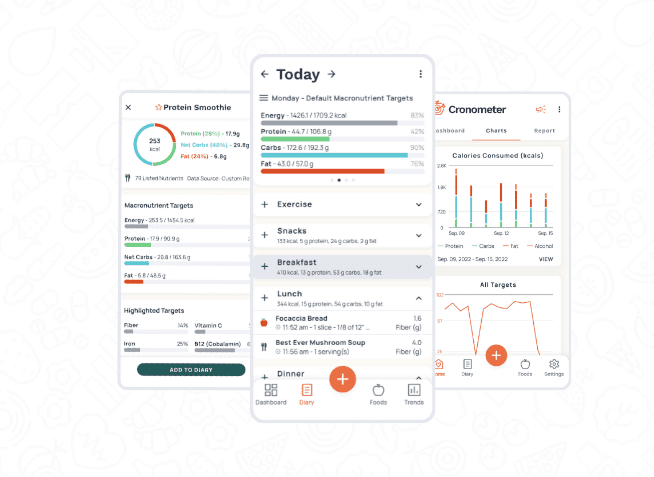How many calories should I be eating?

One of the most frequent questions I receive is, "How many calories should I be eating?" Naturally, it's one of the first questions that comes up when someone starts thinking about how to eat healthier.
If you search for the same question on Google, you'll find a plethora of online calculators that all try to convince you that the number of calories you burn in a day, and thus the number that you should eat, can be determined by filling out a simple form. They take in your weight, height, gender, age, and a primitive estimation of how active you are, and then spit out a number instantaneously: "Jenny, you should eat exactly 1,692 calories per day to reach your goal."
But then if Jenny decides to visit a different calorie calculator, and enter the exact same information, she might get a dramatically different result: "Jenny, you should eat exactly 2,347 calories per day to reach your goal." What gives?

The bottom line is:
An online tool cannot calculate your caloric needs accurately.
For that matter, neither can any "coach" who doesn't have prior experience working with you. So, you might want to think twice before purchasing a generic meal plan from a fitness personality online.
Why not? It's because the calories we burn daily are determined by many obscure factors, including genetics, body composition, diet history, stress level, and the type of activities we do, just to name a few. These elements are complicated and hard, if not impossible, to measure directly.
Luckily, though, we don't actually have to measure them to get you the information you want. There's an accurate, cost-free, and foolproof way to determine your caloric needs. It works whether your goal is weight loss, weight gain, or weight maintenance. It does take about a month of commitment and dedication to following a plan, but in exchange, you won't have to question how much you should eat for a long time to come.
Your step-by-step calorie guide

You will need:
- A food tracking app (I recommend Cronometer)
- A body weight scale
Week 1: Track your current diet, without judgment
- Start logging everything you consume in a food tracking app. Even though its tempting to change your eating habits to make your log look "better", try your best to resist those urges and maintain your usual eating habits.
- Measure your body weight daily, first thing in the morning. Aim for at least 5 days of measurements, though all 7 days is ideal.
Weeks 2 and 3: Eat according to your baseline from Week 1
- Take the average of your total calories over all 7 days from week 1. This should give you a baseline for the number of calories you typically eat in a day.
- For the next two weeks, plan, measure, and track the foods you eat to keep your daily calorie consumption as close to this average as possible. Every day, you should aim to deviate no more than 100 calories in either direction.
- It takes a lot of patience to be consistent for 2 whole weeks. But this step is essential for an accurate measurement, because it allows enough time for your metabolism to adjust to a consistent level of food intake.
- Continue tracking your body weight daily, or as many days as possible.
Take your average body weight from the last 7 days (of Week 3) and compare this average from the initial average you took from Week 1.
- If the averages are roughly the same (less than 1% different), then you are within your maintenance caloric range.
- If there was a decrease of more than 1%, then you are in a caloric deficit, and will lose weight on this amount of calories.
- If there was an increase of more than 1%, then you are in a caloric surplus, and will gain weight on this amount of calories.
Weeks 4 and Beyond: Fine-tune your intake
If you're happy with where you are and maintaining, then you can stop here. Since maintenance occurs within a range of calories, you can get away with eating more or less on any given day and continue to maintain, as long as your average calories are roughly in the ballpark of what you calculated.
If you're not where you want to be, or you want to gain/lose weight, then you can adjust your calories by about 100-200 calories on a weekly or biweekly basis until you achieve your desired result. For instance:
- If you're at maintenance but want to lose weight, reduce your intake by 100-200 calories per week until you see a drop in your weekly average weight.
- If you're losing weight but aim to maintain, increase your intake incrementally each week until your weight stabilizes.

Transitioning to intuitive eating
Once you reach a caloric range where you're happy, you can start easing off precise tracking. Rather than quite cold turkey, gradually ease off by actively observing your portion sizes and practicing the art of estimating them. By building confidence while easing off tracking, you can foster a more sustainable and less rigid relationship with food.
This whole process is a slow, but enlightening journey of discovery. Along the way, you will learn a lot about how your body responds to different amounts of calories and what it feels like to eat more consistently day by day. This way, you can train yourself to make informed decisions about your diet, based on your personal experience and observation, rather than relying generic online calculators and the advice of others.
Looking for more help or support? My door is always open! Sign up for a free coaching call or shoot me a message at michelle@graymatter.health.


